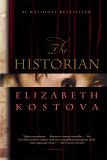Summary | Excerpt | Reading Guide | Reviews | Beyond the Book | Readalikes | Genres & Themes | Author Bio

Critics' Opinion:
Readers' Opinion:
First Published:
Jun 2005, 656 pages
Paperback:
Oct 2006, 688 pages
 Book Reviewed by:
Book Reviewed by:
BookBrowse Review Team
Buy This Book
I can’t say even now what made me pull them down. But the image I saw
at the center of the book, the smell of age that rose from it, and my
discovery that the papers were personal letters all caught my attention
forcibly. I knew I shouldn’t examine my father’s private papers, or
anyone’s, and I was also afraid that Mrs. Clay might suddenly come in to
dust the dustless desk—that must have been what made me look over my
shoulder at the door. But I couldn’t help reading the first paragraph of
the topmost letter, holding it for a couple of minutes as I stood near
the shelves.
December 12, 1930
Trinity College, Oxford
My dear and unfortunate successor:
It is with regret that I imagine you, whoever you are, reading the
account I must put down here. The regret is partly for myself—because I
will surely be at least in trouble, maybe dead, or perhaps worse, if
this is in your hands. But my regret is also for you, my yet-unknown
friend, because only by someone who needs such vile information will
this letter someday be read. If you are not my successor in some other
sense, you will soon be my heir—and I feel sorrow at bequeathing to
another human being my own, perhaps unbelievable, experience of evil.
Why I myself inherited it I don’t know, but I hope to discover that
fact, eventually—perhaps in the course of writing to you or perhaps in
the course of further events.
At this point, my sense of guilt—and something else, too—made me put
the letter hastily back in its envelope, but I thought about it all that
day and all the next. When my father returned from his latest trip, I
looked for an opportunity to ask him about the letters and the strange
book. I waited for him to be free, for us to be alone, but he was very
busy in those days, and something about what I had found made me
hesitate to approach him. Finally I asked him to take me on his next
trip. It was the first time I had kept a secret from him and the first
time I had ever insisted on anything.
Reluctantly, my father agreed. He talked with my teachers and with
Mrs. Clay, and reminded me that there would be ample time for my
homework while he was in meetings. I wasn’t surprised; for a diplomat’s
child there was always waiting to be done. I packed my navy suitcase,
taking my schoolbooks and too many pairs of clean kneesocks. Instead of
leaving the house for school that morning, I departed with my father,
walking silently and gladly beside him toward the station. A train
carried us to Vienna; my father hated planes, which he said took the
travel out of traveling. There we spent one short night in a hotel.
Another train took us through the Alps, past all the white-and-blue
heights of our map at home. Outside a dusty yellow station, my father
started up our rented car, and I held my breath until we turned in at
the gates of a city he had described to me so many times that I could
already see it in my dreams.
Autumn comes early to the foot of the Slovenian Alps. Even before
September, the abundant harvests are followed by a sudden, poignant rain
that lasts for days and brings down leaves in the lanes of the villages.
Now, in my fifties, I find myself wandering that direction every few
years, reliving my first glimpse of the Slovenian countryside. This is
old country. Every autumn mellows it a little more, in aeternum,
each beginning with the same three colors: a green landscape, two or
three yellow leaves falling through a gray afternoon. I suppose the
Romans—who left their walls here and their gargantuan arenas to the
west, on the coast—saw the same autumn and gave the same shiver. When my
father’s car swung through the gates of the oldest of Julian cities, I
hugged myself. For the first time, I had been struck by the excitement
of the traveler who looks history in her subtle face.
Copyright © 2005 by Elizabeth Kostova. All rights reserved. No part of this book maybe reproduced without written permission from the publisher Little, Brown & Co.





The House on Biscayne Bay
by Chanel Cleeton
As death stalks a gothic mansion in Miami, the lives of two women intertwine as the past and present collide.

The Flower Sisters
by Michelle Collins Anderson
From the new Fannie Flagg of the Ozarks, a richly-woven story of family, forgiveness, and reinvention.

The Funeral Cryer by Wenyan Lu
Debut novelist Wenyan Lu brings us this witty yet profound story about one woman's midlife reawakening in contemporary rural China.
Your guide toexceptional books
BookBrowse seeks out and recommends the best in contemporary fiction and nonfiction—books that not only engage and entertain but also deepen our understanding of ourselves and the world around us.